This project was organized by the University of Washington Women in Economics group and funded by a Diversity and Inclusion Seed Grant Award from the University of Washington Office of Minority Affairs & Diversity. We recognize the value of diversity and inclusion and appreciate the opportunity to showcase students’ work and these outstanding economists. Students enrolled in ECON 396, 408, and 423 during spring quarter of 2018 composed the biographies included in this display. Each participating student selected and researched an economist, then composed and submitted a biography. Finalists included in this display were selected based on a rubric distributed to students in advance.
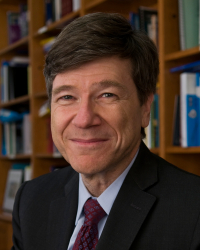
Jeffrey Sachs earned his bachelor’s, master’s, and doctorate degree in economics from Harvard University. Upon graduation from the Ph.D. program, he quickly climbed the ranks in the economics faculty at Harvard and became a tenured professor by age 28. To this day, Sachs is a leading development economist with a focus on sustainable development, globalization, and poverty. He is globally renowned for his extensive involvement in transition economies and the United Nations Sustainable Development Goals.
Sachs was instrumental in the elimination of Bolivia’s hyperinflation during its democratic transition in 1985. He was also heavily involved in the capitalization of former centralized economies in Eastern Europe. By helping Poland develop a debt reduction program, Sachs was able to aid Poland’s government in successfully navigating their transition to a decentralized economy. As a result of this contribution, Sachs was awarded an honorary degree and the government’s highest honor of the Commander’s Cross of Order of Merit. Sachs continued to advise Estonia, Slovenia, and Russia on their transitional economies throughout the 1990s.
Recently, Sachs has focused on poverty alleviation by encouraging better agricultural practices in impoverished regions of the world. He directs the Millennium Villages Project and works with the Islamic Development Bank to build sustainable agriculture in African countries. Sachs’ approach to economic development is increasingly focused on the public health aspect of development. In addition to advocating for increased aid to help fight malaria, Sachs also helped launch The Global Fund to Fight AIDS, Tuberculosis, and Malaria, and is an avid supporter of the United Nations Millennium Development Goals.
Sachs was named one of the 100 Most Influential People in the World by TIME Magazine in both 2004 and 2005. He also received the Centennial Medal from Harvard for profound contributions to society, and has been awarded numerous honorary degrees from universities around the globe. He is a New York Times bestselling author for three of his works, including his renowned publication: The End of Poverty: Economic Possibilities for Our Time.

Hina Rabbani Khar was born on November 19, 1977 in Punjab, Pakistan. She attended Lahore University of Management Sciences, where she graduated with a Bachelor of Science in Economics in 1999. After her undergraduate studies, she ventured to the University of Massachusetts at Amherst, where she earned a Master of Science in Business Management in 2002.
In the Pakistani general elections of 2002, Khar followed the footsteps of her father and was elected as a member of the Pakistani National Assembly. Only a year later, she was appointed to the position of Parliamentary Secretary for Economic Affairs and Statistics, where she coordinated with international relief funds to provide aid after the devastating earthquake in Northern Pakistan in 2005. In 2008, she became the Pakistani Minister of State for Finance and Economic Affairs under former Prime Minister Yousaf Raza Gillani. As Minister of State for Finance and Economic Affairs, Khar was able to play an instrumental role in shaping Pakistan’s economic policies and financial budget.
In 2010, Khar presented the federal budget to the Pakistani Parliament, becoming the first female in history to present the budget of Pakistan to the National Assembly. In 2011, the government of Pakistan promoted Khar to Minister of State for Foreign Affairs, making her the youngest and first female Minister of Foreign Affairs in Pakistani history. Despite facing adversity with regards to the rights of women in Pakistan, Khar was able to persevere through those cultural barriers to show an economist does not have to fit into one traditional mold.
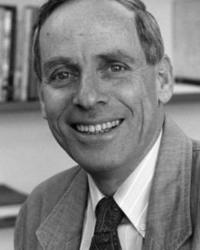
Amos Tversky was a pioneer in the field of behavioral economics. Born and raised in Israel, he was awarded Israel’s highest military honor after bravely saving the life of a fellow soldier at the age of 19. After bouncing around many different disciplines, he eventually received his undergraduate degree in philosophy and psychology from the Hebrew University of Jerusalem in 1961. He later received his Doctorate in Psychology from the University of Michigan in 1965. After completing his degree, Dr. Tversky proceeded to teach at the Hebrew University of Jerusalem, University of Michigan, and Harvard University. In 1978, he gave up his position at Hebrew University to join the Department of Psychology at Stanford, where he would receive numerous honorary doctorates along with a five-year MacArthur fellowship.
It was said that Dr. Tversky spent most of his time in his office with his colleague Daniel Kahneman, debating the fundamentals of cognitive behavior and rational decision making. Despite Dr. Tversky’s title as a Professor of Psychology, much of his research on decision making has been applied to the fields of business, law, and economics. The research he conducted with his colleague, Dr. Kahneman, related to how people manage risk and uncertainty. This was derived from Tversky’s observations in what he called “anomalies and contradictions in human behavior.”
Colleagues thought highly of Amos Tversky, and even created a tongue-in-cheek test named after him, called the Tversky Intelligence Test. The test had one simple rule: the faster you realized Tversky was smarter than you, the smarter you were. Although Dr. Tversky lived a short life, passing away in 1996 at the age of 59, his findings lived on and were eventually recognized when Daniel Kahneman won the Nobel Prize in Economics for the work that these two economists completed together. Amos Tversky was a leading theorist who challenged the fundamentals of economic theory by showing that individuals regularly do not behave rationally.
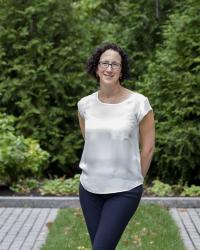
Amy Finkelstein is an American economist who grew up in New York City. After graduating from high school, Finkelstein attended Harvard University where she graduated summa cum laude with a Bachelor of Arts in Government. Finkelstein later completed a Master of Philosophy in Economics at Oxford University. Hoping to learn more about healthcare, insurance, and public policy, Finkelstein pursued a Ph.D. in Economics at the Massachusetts Institute of Technology. In 2001, her dissertation received honorable mention from both the National Tax Association and the National Academy of Social Insurance.
Finkelstein has been teaching economics at MIT since 2005. In addition to teaching, she acted as an associate editor and co-editor for the Journal of Public Economics from 2004 to 2014. Between 2007 and 2011, Finkelstein also served on the Panel of Health Advisers for the Congressional Budget Office. In 2016, MIT recognized Finkelstein’s outstanding achievements in the field of economics by naming her the John and Jennie S. MacDonald Professor for a five-year term.
Finkelstein spent most of her academic career studying the impact of health insurance, disability programs, and other government policies on labor markets. She currently studies market failures in insurance markets, and government intervention in healthcare markets. Most notably, Finkelstein served as one of the two principal investigators who led the Oregon Health Insurance Experiment in 2008.
In 2012, Finkelstein was awarded the John Bates Clark Medal from the American Economic Association for her research concerning the relationship between asymmetric information and the inefficiencies in insurance markets. Apart from her outstanding achievements in the field of health economics, Finkelstein serves as a role model in that she was able to use what she learned to reform the health insurance market and help low-income individuals obtain better medical care.
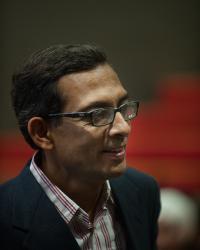
Abhijit Banerjee was born in Kolkata, India in 1961. He attended the University of Calcutta and Jawaharlal Nehru University before receiving his Ph.D. from Harvard University in 1988.
In 2003, Banerjee founded the Abdul Latif Jameel Poverty Action Lab (J-PAL), a global research center dedicated to reducing poverty through science-based policy implementations. Banerjee is also a past president of the Bureau for Research and Economic Analysis of Development, a non-profit organization devoted to encouraging research and scholarship in development economics. In terms of accolades, he received the Infosys Prize in Social Sciences and Economics in 2009, and was named one of Foreign Policy Magazine’s Top 100 Global Thinkers in 2011. The same year, Banerjee authored a book titled Poor Economics: A Radical Rethinking of the Way to Fight Global Poverty, which received the Goldman Sachs Business Book of the Year Award in 2011.
In addition to remaining one of the directors of his Poverty Action Lab, Banerjee has also served as an advisor to various organizations such as the World Bank and the government of India. Currently, he stands as the Ford Foundation International Professor of Economics at the Massachusetts Institute of Technology.
Abhijit Banerjee’s story is not only one of well-deserved success, but also of diversity. Growing up in India and finishing his education in the U.S., Banerjee has bridged gaps and worked for entities not only in India and the United States, but also in other parts of the world. He is heavily involved in research regarding poverty in various countries and is active in the field of economic development. Both areas have similar goals: promoting diversity and helping those in need. Banerjee is an example of the difference an economist can make not only in their local economy, but also in the world.
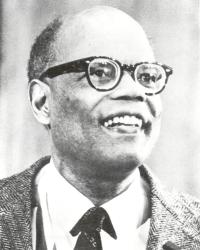
Sir William Arthur Lewis was born in 1915 in Castries, Saint Lucia. He finished his secondary education at age 14 and was too young to accept a government scholarship to attend a British university, so he became a junior clerk in the public service for four years. At age 18, Lewis enrolled at the London School of Economics, where he completed a Bachelor of Commerce in 1937 and a Ph.D. in Economics in 1940.
After graduation, Lewis became a lecturer at his alma mater and taught as a professor at University of Manchester and Princeton University. From 1959 to 1962, he served as the principal of University College of the West Indies. Lewis then went on to help institute the Caribbean Development Bank – one of the many economic development advisory services he provided to Caribbean, African, and Asian governments.
Growing up in a developing nation, Lewis gravitated towards studying issues of economic development. He focused particularly on the impact of trade and industrialization on labor, wages, and poverty. During his career, Lewis created two models explaining growth in developing economies, one of them being his signature “Dual Sector Model,” which revolutionized the way that many scholars studied and thought about economic development. This model analyzed the relationship between two sectors of developing nations, one being the traditional agricultural sector with an abundance of labor and low wages, and the other being the modern industrial sector that featured a shortage of labor and higher wages due to high labor demand. Lewis postulated that an increase in investment in developing nations leads to improvement and equalization of production and wages in both sectors.
In 1963, Sir Lewis’ work for less economically developed countries was recognized when he was knighted into British society. After many years of research and teaching at prestigious universities, Lewis earned the Nobel Prize in Economics in 1979 for his transcending research on developing nations. He was the first black individual to win a Nobel award aside from the Nobel Peace Prize. After retiring from teaching in 1983, Sir William Arthur Lewis became president of the American Economics Association. He passed away in 1991 at the age of 76.
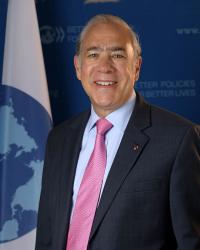
Jose Angel Gurría was born on May 8th, 1950 in Tampico, Mexico. After graduating from high school, Mr. Gurría went on to earn a B.A. in Economics from the National Autonomous University of Mexico, and an M.A. in Economics from Leeds University in the United Kingdom. He has received honorary degrees from a variety of universities across the globe, including La Universidad de Valle de México, the European University of Madrid, and the University of Leeds.
In December 1994, Gurría became Mexico’s Minister of Foreign Affairs. He made dialogue and consensus-building one of the hallmarks of his approach to global issues until his departure from the position in January 1998. From January 1998 to December 2000, he served as Mexico’s Minister of Finance and Public Credit. He inherited the worst banking crisis in Mexican history, which included the largest depreciation of the Mexican Peso in one year, and the most severe recession in over a decade, with GDP falling over 6% in 1995. Soon after his appointment, Gurría became the architect of Mexican economic stabilization, cutting government spending six times. For the first time in a generation, Mexico’s economy was able to withstand a change of administration without a recurrence of the financial crises that had previously dogged such transitions.
Since 2006, Angel Gurría has served as Secretary General of the Organization of Economic Cooperation and Development (OECD), firmly establishing the OECD as a pillar of the global economic governance architecture. Gurria broadened the OECD’s membership to include Chile, Estonia, Israel, Latvia and Slovenia, making the OECD more inclusive by strengthening its links with key emerging economies. Under his watch, the OECD is leading the effort to reform the international tax system and improve governance frameworks in anti-corruption and other fields. He has also heralded a new growth narrative that promotes the well-being of people, including women and youth, and has scaled up the OECD contribution to the global agenda, including the Paris Agreement on Climate Change and the adoption of the sustainable development practices.
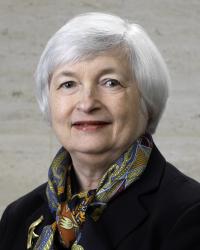
Janet Yellen grew up in a Polish-Jewish family in Brooklyn, New York. After graduating as valedictorian of her high school in 1963, she attended Brown University where she graduated summa cum laude with a Bachelor of Arts in Economics. Hoping to learn more about the human impact of economic policies, Yellen pursued a Ph.D. in Economics at Yale University where she wrote a dissertation on employment, output, and capital accumulation. Yellen was the only woman to receive a Doctorate in Economics from Yale University in 1971.
Yellen has taught economics at several distinguished institutions including the London School of Economics, University of California Berkeley, and Harvard University, where she was one of only two women in the Economics Department faculty. In 2004, she became the President and CEO of the Federal Reserve Bank of San Francisco, and in 2010, she was nominated by President Barack Obama for Vice Chair of the Federal Reserve. In 2014, she replaced Ben Bernanke and became the Chair of the Federal Reserve. She was the first woman in U.S. history to become Chair of the Federal Reserve, and the first Democrat to hold this position since 1979.
Yellen spent most of her academic career studying the causes of unemployment and the impact of joblessness on workers. During her time as Chair of the Fed, the unemployment rate decreased by 2.6% and, despite her dovish approach to monetary policy, she ended her term as Chair with an inflation rate just above the Fed’s target rate of 2%.
Yellen is regarded by her students as an outstanding teacher, known for her patience and handwritten lecture notes. Her colleagues describe her as a brilliant, calm, and devoted public servant that always considers the human side of economics. At a time when few women held leadership positions in the field of economics, Yellen had the resilience and fortitude to transcend these boundaries and make history. Her contributions to the field of economics resulted in her being named the second most powerful woman in the world by Forbes Magazine in 2014.
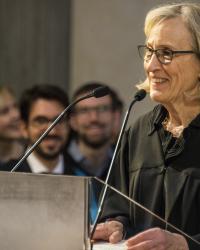
Claudia Goldin was born in 1946 in New York City. She received an undergraduate degree from Cornell University and completed her Ph.D. in Economics at the University of Chicago in 1972. Recognizing the unequal treatment of women in the workplace, Goldin decided to use her research to bring awareness to economic issues surrounding women. One of her goals was to inspire young women to pursue a higher education.
Goldin is best known for her unique and outstanding research surrounding the role of women in the U.S economy. Her recent papers have described and analyzed changes in female labor force participation over the past century, and explored the causes of the upsurge in female college attendance in the United States. Goldin’s research has also discussed wage differentials between men and women, and examined a woman’s surname after marriage as a social indicator.
Currently, Goldin is completing a wide-ranging project on the family and career transitions of male and female college graduates from the late nineteenth century to the present. This project is known as the “Harvard and Beyond Project,” and its goal is to examine the historical evolution of career and family outcomes among U.S. collegeeducated men and women. The data will be used to study multiple cohorts of individual who attend Harvard University.
Through her research, Goldin took action to instigate social change. Her outstanding efforts were recognized when in 1990, she became the first female professor to achieve tenure in the Department of Economics at Harvard.
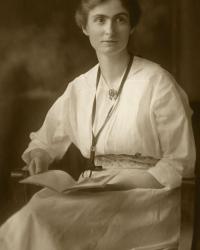
Edith Abbott was born in Nebraska in 1876 to parents who were activists of social reform and women’s rights. Due to financial hardship, Abbott worked her way through college as a school teacher. She received her undergraduate degree in 1901 from the University of Nebraska, and her Ph.D. in Economics from the University of Chicago in 1905. After receiving a Carnegie Fellowship in 1906, Abbott continued her study of poverty and development at the London School of Economics and University College London.
Abbott’s academic career began at Wellesley College in 1907, after which she moved to the Chicago School of Civics and Philanthropy where she conducted extensive research on the conditions of tenements, the effectiveness of juvenile courts, and the impact of poor school attendance on children. Abbott’s research in these areas resulted in the creation of policies which limited child labor and compelled children to attend school. In 1920, the Chicago School of Civics and Philanthropy was absorbed by the University of Chicago, and Abbott joined their faculty. She later contributed to the creation of the University of Chicago’s Social Service Review.
In her time at the University of Chicago, Abbott changed the discipline of social economics by increasing its emphasis on historical, economic, and political data as factors that contribute to poverty. In 1924, she was named dean of the University of Chicago’s Graduate School of Social Service Administration, becoming the first female dean of an American graduate school. She later went on to become a respected welfare and immigration economist who advised President Franklin D. Roosevelt. Her impact on social and development economics revolutionized the field and broke significant gender barriers, making her legacy one that will remembered for years.
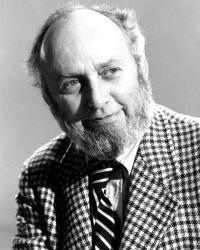
Douglass North (Nov. 5, 1920—Nov. 23, 2015) was an American economist born in Cambridge, Massachusetts. He completed a triple major in philosophy, economics, and political science at the University of California, Berkeley in 1942. He received a Ph.D. in Economics from the same institution in 1952. North was a key contributor to research in property rights and the development of institutions. His most prominent works relate to the importance of institutions as they relate to the creation of public governance, property rights, and corruption.
North diverged from traditional economic thought as he found that market economics do not adequately account for all economic growth. He claimed that institutions are key factors of economic growth, and using large amounts of data, he paved the way for new ‘cliometricians’ by creating new tools for analyzing economics from an institutional perspective. His research dove further into society by then looking for answers to explain human behavior that led to the creation of societies.
North won the Nobel Prize in Economics in 1993 and reported that his drive for pursuing research in economics stemmed from his desire to improve societies by understanding economic successes and failures. By teaching at the University of Washington for 33 years and at Washington University in St. Louis for 28, North also contributed significantly to the education of many future economists.
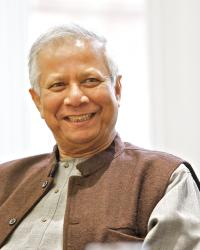
Muhammad Yunus grew up in the city of Chittagong in the former British India as the third of 14 children. He earned his undergraduate degree in economics from Chittagong University in 1960. Upon earning his master’s degree from Dhaka University in 1961, Yunus and his father acquired a loan to establish a printing and packaging company. Despite the success of his family business, Yunus aspired to be a teacher. After receiving a Fulbright scholarship, Yunus traveled to the United States where he earned a Ph.D. in Economics from Vanderbilt University in 1968.
When Bangladesh won its independence in 1971, Yunus returned to his home country to join the Government Planning Commission. He later returned to Chittagong University as the head of the Economics department. His work outside of the classroom began with the establishment of the Chittagong University Rural Development Project, which gave students academic credit for community engagements such as assisting local farmers.
During his work with the local community, Yunus met with individuals from the nearby village of Jobra, learning about the extreme poverty of the villagers and the predatory lending practices used by local moneylenders. Recalling his family’s ability to create their business with a small loan, Yunus and his students found that just $27 would provide every individual in the village the money they needed to buy their raw materials. After personally lending the $27 to the local villagers, Yunus decided to approach Janata Bank, one of the largest investment banks in Bangladesh, with a proposition. He advocated for a program that would give small loans to the very poor, which later became known as microfinancing. Despite initial hesitation, the program later took off, eventually turning into Grameen Bank. When asked about the mission of the Grameen Bank, Yunus said, “it is not the poor who aren’t creditworthy, but the banks that are not peopleworthy.”
Yunus won the Nobel Peace Prize in 2006 for his role in establishing the Grameen Bank and microfinance as a tool for economic and social development. In addition to his extensive economic background, Yunus, who has earned the nickname “Banker to the Poor,” has established himself as a visionary in the field by successfully using his economic background to create real world solutions.
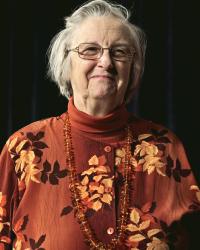
Elinor Claire Lin Ostrom (August 7, 1933 – June 12, 2012) was a political economist born in Los Angeles, California. She received a B.A. in Political Science from UCLA in 1954, and a Ph.D. in Political Science from UCLA in 1965.
Despite completing both her degrees in political science, Ostrom’s research had an immense impact on the field of economics. Her work focused on how communities manage common resources and how to identify principles that lead to sustainable resource management. By observing communal arrangements in forest use, fisheries, grazing meadows, and other commons in a diverse set of countries such as Indonesia, Nigeria, Switzerland, and Sweden, Ostrom discovered that communities can often self-regulate resource use successfully. She believed that local arrangements could prevent overfishing in a common waterbody or overgrazing in a communal meadow. She outlined the key properties that prevented overuse in these arrangements in her book titled Governing the Commons. Examples of these properties included clearly defining boundaries for use, letting those who are affected by the arrangement participate in making the rules, providing low cost dispute solving mechanisms, and punishing violators with graduated sanctions.
Ostrom’s research challenged the conventional economic notion that without either privatization or government intervention, communal resources will be depleted by free riders acting in self-interest. She won the Nobel Prize in Economics in 2009 for her work, making her the first woman to be awarded the Nobel Prize in Economics. By looking beyond the dichotomy of the market or state, Ostrom expanded the set of ideas used to conceptualize the methods of resource allocation. She will be remembered as someone who redefined both the concept of the commons and the concept of a traditional economist.
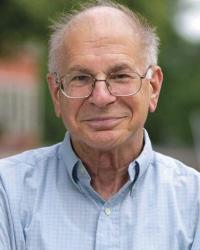
Daniel Kahneman was born in Tel Aviv, Mandatory Palestine in 1934. He lived in Paris during his childhood and survived World War II under Nazi occupation. Kahneman moved back to where he was born in 1948, just before the creation of the state of Israel. He attended the Hebrew University of Jerusalem where he received a Bachelor of Science in Psychology with a minor in mathematics in 1954. He worked briefly in the psychology department of the Israeli Defense Forces before he went to the University of California Berkeley for his Ph.D. in Psychology.
Kahneman taught at various institutions including the Hebrew University of Jerusalem, the University of British Columbia, and Princeton University. He also briefly lectured at Harvard University. In the late 1960s, Kahneman met Amos Tversky, beginning their decadeslong collaboration. At the beginning, Kahneman and Tversky focused on the general field of judgment and decision making in cognitive psychology, but later they turned to economics and published their prospect theory in 1979. Prospect theory, which is considered to be the foundation of behavioral economics, utilizes cognitive psychology to explain phenomena that classical economic theory cannot. In 2002, Kahneman won the Nobel Prize in Economics for the prospect theory that Kahneman and Tversky developed together.
Starting as a psychologist, Kahneman contributed extensively to the field of economics. He expanded the diversity of the discipline by incorporating psychological traits of humans into economic science. Kahneman continues to introduce diversity to the field by shifting his focus to hedonic psychology, which loosely translates to ‘happiness economics.’ It is clear that Kahneman’s interdisciplinary approach has been an asset to the discipline.
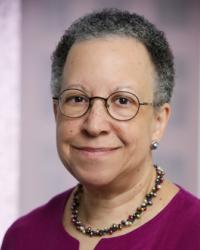
Margaret Simms is a nationally recognized American economist with a long career focused on poverty and the economic well-being of African Americans. She began her college career at Carleton College during the cultural upheaval of the 1960s. She was one of only four African Americans in her freshman class, and one of only five female students in the economics major at Carleton. Simms continued on to graduate school at Stanford University in 1967, where at the time, there were no women or African Americans in the economics department faculty. Her focus quickly turned to domestic issues and policies, especially those surrounding vulnerable populations.
Throughout a long and prestigious career, Margaret Simms has held numerous important positions in organizations focusing on poverty and development. For the 1977-1978 academic year, she joined the U.S. Department of Housing and Urban Development as a Brookings Economic Policy Fellow. She later moved on to the Urban Institute for seven years and then the Joint Center for Political and Economic studies for twenty-one years as the director of the Minorities and Social Policies Program. Currently, she has returned to the Urban Institute where she serves as Director of their Low-Income Working Families Project. Her research focuses on families that live below 200% of the poverty line, the factors that lead them there, and the policies that can aid these families.
Simms’ work has brought her numerous awards and recognition. In addition to being elected to the American Academy of Arts and Sciences, Simms became the second female winner of the Samuel Z. Westerfield award from the National Economic Association. She was also presented an honorary law degree from her alma mater Carleton College. She is a pivotal economic thinker with a passion for helping those among us who are the most in need.
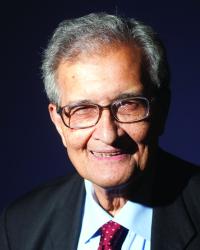
Amartya Sen is a Bangladeshi economist who has worked in India, the United Kingdom, and the United States. He earned a B.A. and Ph.D. in Economics from Trinity College in Cambridge in 1955 and 1959, respectively. He won the Nobel Prize in Economics in 1998 for his work on welfare economics and social choice theory. Sen’s work is said to be a mixture of economics and philosophy. His idea of a developed country includes not only a country with high consumption, but also a country with various other freedoms like access to education, healthcare, and democratic elections. This different approach of looking at development through rights of the citizens of a nation had considerable influence on the formation of the Human Development Report by the United Nations.
Sen’s most notable work is titled Poverty and Famines: An essay on Entitlement and Deprivation, in which he concluded that famines occur not only because of food scarcity, but also because of an inability of systems to distribute food. Building on this, Sen presented data that proved that the Bengal famine, which he witnessed as a nine-year old boy, was caused by panic buying, hoarding, and price gouging rather than a lack of food. This revelation has influenced the workings of many governments and international organizations that handle food shortages throughout the world.
Sen has worked to encourage policy makers to not only alleviate immediate suffering, but also to ensure stable food prices and wages for the poor. He has also said that for any economic growth to happen, there must first be social reform like improvements in healthcare and education.

Dambisa Moyo is a Zambian economist who specializes in international economy and theories on global affairs. She was born on February 2, 1969 in Lusaka, Zambia. Initially starting her undergraduate degree at the University of Zambia, she continued her degree at the American University in Washington D.C. on scholarship. There she also earned an MBA with specialization in Finance in 1993. In addition to her M.B.A., Moyo earned her MPA degree at Harvard University’s Kennedy School in 1997. She earned her Ph.D. in Economics from Oxford University, where her dissertation focused on the macroeconomy and savings rates in developing countries.
Moyo has worked at the World Bank as a consultant, at Goldman Sachs as a research economist and strategist, and at SABMiller as a board member. She has written three New York Times bestselling books on the harmful effects of government foreign aid on Africa and the economic influence of the West. In addition, Moyo has been recognized as one of Time Magazine’s 100 Most Influential People and the World Economic Forum’s Young Global Leader, among other honors. Presently, she lives in New York City and serves as a committee member in corporate responsibility, financial risk, and auditing for Barclays Bank, Barrick Gold, and Chevron Company.
Dambisa Moyo is an exceptional economist not only because of her incredible academic achievements and work experience, but also because of her dedication to influencing public policy and sustainable economic development on an international level. In addition to writing articles on the global framework for immigration and how technology can support global growth, Moyo extensively advocates for conversations surrounding economic cooperation and social justice. She has spoken publicly at global financial summits, like the World Economic Forum, and has written in a number of international economic journals on issues regarding responsible foreign aid through the macroeconomic framework.
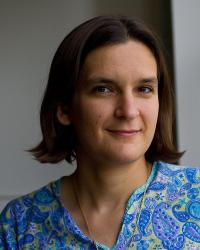
Esther Duflo was born on October 25, 1972 in Paris, France. She started her undergraduate education at École Normale Supérieure in Paris to study history. In her second year, she questioned her future as a historian and began considering a career in the civil service or politics. Her journey continued when she worked as a research assistant for a French economist. This job connected her to the Bank of Russia to primarily work with Jeffrey Sachs, who was an American economist at Harvard. This experience allowed her to realize that economics had potential as a level of action in the world in which she could satisfy academic ambitions while doing things that mattered.
Duflo finished her degree in history and economics in 1994 while receiving a master’s degree from DELTA, which is now known as the Paris School of Economics. Subsequently, she completed a Ph.D. in Economics at MIT in 1999. Her Ph.D. dissertation focused on the effects of a natural experiment from the data of an Indonesian school expansion program in the 1970s. It provided the first conclusive evidence that, for a developing country, more education resulted in higher wages for the general population.
In 2003, she co-founded the Poverty Action Lab at MIT, which since then, has conducted more than 200 empirical development experiments and trained development practitioners in running randomized controlled trials. Their mission is “to reduce poverty by ensuring that policy is informed by scientific evidence through research, policy outreach, and training.”
Duflo has won many awards such as the 2014 Infosys Prize in Economics, and was a recipient of the 2010 John Bates Clark Medal for economists under 40. Overall, Duflo has been known for her brilliant work in social and development economics, and is responsible for the emergence of a new subject of academic study which combines the idea of doing good science and the thought of doing good.
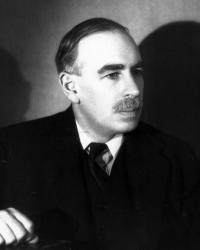
John Maynard Keynes was born in Cambridge, England in 1883. He earned his bachelor’s degree in mathematics from Cambridge University in 1904. In a twist of fate, famous mathematician Alfred Marshall pushed Keynes to study economics, but Keynes decided to proceed with mathematics and philosophy. After working in several government positions of increasing economic relevance, Keynes worked for the British Treasury and was a representative for his country in the negotiations of the Treaty of Versailles. He resigned from the position when he argued that punishing Germany too greatly would lead to what eventually resulted in the rise of Wehrmacht. After resigning, he worked as a personal investor and a guest speaker at Cambridge University.
In 1936, Keynes published his most influential book, The General Theory of Employment, Interest, and Money. In this monumental text, he argued several concepts that are essential to our understanding of macroeconomics, which include the notion of the government running a deficit to stimulate the economy, and that output is determined by demand. Keynes also postulated that aggregate demand is the sum of consumption spending, investment spending, government spending, and net exports. These concepts established the school of economic thought known as Keynesian Economics. These ideas, and specifically the notion of governments running a deficit to stimulate the economy, aided the United States government in helping America recover from the Great Depression. Keynes’ view that the government should intervene in the economy broke the traditional belief established by economist Adam Smith that laissez-faire economics was the only available economic strategy for governments.
In a time when homosexuality was persecuted in the United Kingdom, Keynes had the courage to be openly bisexual. The day after his death in 1946, the Times wrote of Keynes, “to find an economist of comparable influence, one would have to go back to Adam Smith.” As a mathematician, investor, and the founder of Keynesian economics, John Maynard Keynes is perhaps both the most revolutionary and influential economist of the twentieth century.
Acknowledgments
Special thanks to the University of Washington Office of Minority Affairs & Diversity and to the Department of Economics for their support of this project. Thanks also to the UW Women in Economics student board members, especially Nadya Ekhteraee-Sanaee and Kiana Rahni for their extensive contributions. Finally, we appreciate the work of all the students who submitted their work for consideration. The following students are featured in this display:
Keegan Boehm
Warren Case
Claudia Chui
Miles Goldsmith
Bo Goodrich
Armaan Singh Lamba
Zhi Li
Yuying Ma
Steven Nash
Johnathan Nguyen
Luis Puga
Kiana Rahni
Devin Reimers
Nadya Ekhteraee-Sanaee
Ryan Shiplet
Royce Stewart
Robert Walatka